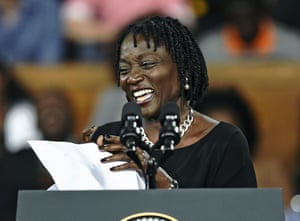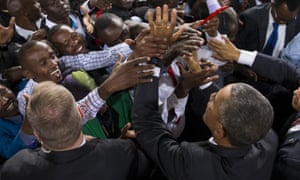Barack Obama in Kenya: 'no excuse' for treating women as second-class citizens
- ‘Just because something is part of your past doesn’t make it right’, Obama says
- Rousing address in Nairobi also offers insight into his African heritage
- The Guardian
Barack Obama wrapped up his visit to Kenya on Sunday with a strong condemnation of female genital mutilation and other “bad traditions” that treat women as second-class citizens, in a speech that also a offered a poignant glimpse into his African heritage.
The US president, whose ancestry has at times been a politically awkward part of his identity, looked at ease as he embraced his status as a “Kenyan American” in a major speech that also condemned corruption, tribalism and terrorism.
Obama earned vociferous applause from 4,500 Kenyans at a sports arena in the capital, Nairobi, by throwing down the gauntlet over the rights of women and girls. He gave short shrift to those in Africa who hide behind arguments defending tradition and culture against values they say are imposed by the west. Considering his heritage, it was a case he could make better than any previous US president.
“Every country and every culture has traditions that are unique and help make that country what it is, but just because something is part of your past doesn’t make it right; it doesn’t mean it defines your future,” Obama said, citing the recent debate in America over the Confederate flag.
“Around the world there is a tradition of oppressing women and treating them differently and not giving them the same opportunities, and husbands beating their wives, and children not being sent to school. Those are traditions. Treating women and girls as second-class citizens. Those are bad traditions. They need to change.”
An estimated 31 million girls of primary school age and 32 million girls of lower secondary school age were out of school in 2013, according to the United Nations. In sub-Saharan Africa, only two of 35 countries measured have gender parity, the lowest ratio in the world. More than one in four girls in Kenya is subjected to genital mutilation, which carries a risk of severe bleeding, problems urinating, infections, infertility and complications in childbirth.
Obama said: “Treating women as second-class citizens is a bad tradition: it holds you back. There’s no excuse for sexual assault or domestic violence, there’s no reason that young girls should suffer genital mutilation, there’s no place in a civilised society for the early or forced marriage of children. These traditions may go back centuries; they have no place in the 21st century.”
The comment appeared to strike a nerve, triggering enthusiastic clapping and approving whistles.
Obama continued: “They are issues of right or wrong in any culture. But they are also issues of success and failure. Any nation that fails to educate its girls or employ its women and allow them to maximise their potential is doomed to fall behind the global economy. We’re in a sports centre: imagine if you have a team and don’t let half of the team play. That’s stupid. That makes no sense.”
The speech came a day after Obama had strongly challenged Africa over gay rights, comparing the issue with discrimination against African Americans. At Kenya’s state house he was in open disagreement with President Uhuru Kenyatta, who described it as a “non-issue”.
Returning to his father’s homeland for the first time since he reached the White House, Obama was able to use his huge popularity here to call for change. Rahab Gichihu, 23, a public administration student, welcomed his intervention on female genital mutilation.
“Coming from him means more and carries more weight,” she said. “He understands the culture of Kenya and the pressures that exist. He speaks to young people directly.”
Matere Gathuru, 20, studying commerce, said: “As a Kenyan I feel very good that the most powerful man in the world is of Kenyan origin. It makes me feel strong and gives me hope in life. My boundaries are not only Kenya: I can go on in the world and do a lot of things.”

The US president had been introduced to the rapturous crowd by his half-sister, Auma, who looked after him on hisfirst trip to Kenya in 1987. “He gets us,” she said, describing him as “my brother, your brother, our son”.
Obama declared: “I am proud to be the first American president to come to Kenya – and of course I’m the first Kenyan American to be president of the United States,” prompting a cheer that almost blew the lid off the arena, which was bedecked in US and Kenyan flags.
The president, who turns 54 next week, then offered a glimpse both jocular and moving of what the country has meant to him.
“The first time I came to Kenya things were a little different,” he mused. “I arrived at Kenyatta airport; the airline had lost my bags. That doesn’t happen on Air Force One. They always have my luggage on Air Force One.”
Auma had picked him up in an old VW Beetle that broke down four or five times. “I slept on a cot in her apartment. Instead of eating at fancy banquets with the president we were drinking tea and eating ugali and sukuma wiki. So there wasn’t a lot of luxury. Sometimes the lights would go out.
“But you know, there was something more important than luxury on that first trip and that was a sense of being recognised, being seen.”
Obama had left university a few years earlier, worked as a community organiserin deprived areas of Chicago and was poised for law school. “When I came here, in many ways I was a westerner,” he said, “I was an American, unfamiliar with my father and his birthplace, really disconnected from half of my heritage.
“And at that airport, as I was trying to find my luggage, there was a woman there who worked for the airlines, and she was helping fill out the forms, and she saw my name and she looked up and she asked if I was related to my father, who she had known. And that was the first time that my name meant something.”
Obama went on to meet various family members during his stay in Kenya and search for details about his father, whom he had only met once when he was 10, as well as other ancestors. “I learned things about their lives that I could never have learned from books,” he said. “In many ways their lives offered snapshots of Kenya’s history, but they also told us something about the future.”


His grandfather had been a cook for the British during the colonial era. “As I went through some of his belongings when I went upcountry, I found the passbook he had had to carry as a domestic servant. It listed his age and his height, his tribe, listed the number of teeth he had missing. And he was referred to as a ‘boy’, though he was a grown man, in that passbook.”
Obama’s grandfather had served in Burma for the King’s African Rifles during the second world war. On his return, he endured detention because he was linked to a group that opposed British rule.
“Eventually he was released and forged a home for himself and his family and he earned the respect of his village,” Obama continued. “He lived a life of dignity, although he had a well-earned reputation for being so strict that everybody was scared of him and he became estranged from part of his family.”
Obama’s father, Barack Obama senior, was a proud member of Kenya’s liberation generation. The young Obama found letters his father had written to 30 American universities, applying for a scholarship. The University of Hawaii said yes, so he gained an education – and met Obama’s mother – before returning home. He died in a car crash in Nairobi in 1982, aged 46.
“First he found success as an economist and worked with government,” Obama said, “but ultimately he found disappointment, in part because he couldn’t reconcile the ideas that he had for his young country with the hard realities that confronted him.”
In characteristic fashion, Obama wove together the history of Kenya, which became independent a few years after he was born, with his own story. “A young, ambitious Kenyan today should not have to do what my grandfather did and serve a foreign master. You don’t need to do what my father did and leave your home to get a good education and access to opportunity. Because of Kenya’s progress, because of your potential, you can build your future right here, right now.”
Later he met opposition politicians and civil society leaders, discussing issues such as wildlife trafficking and political devolution. Thousands of people lined the route in the hope of glimpsing the presidential convoy as Obama returned to Kenyatta airport and boarded Air Force One, turning for a hearty smile and farewell wave.

He went on to become the first sitting US president to visit neighbouring Ethiopia, another security ally and fast-growing economy but much criticised by human rights watchdogs. The ruling party there won the recent general election with a 100% majority. At least one opposition party has claimed its members were arrested ahead of Obama’s visit, on suspicion they would make trouble.
Ben Rhodes, the US deputy national security adviser for strategic communication, said human rights would be a focal point of discussion.
“The Ethiopian government has made extraordinary progress in bringing greater development and opportunity to its citizens,” he said, “but there are very significant restrictions that are not consistent with the universal values that we stand up for: for instance, the need for a free press.
“And we’ve seen too much intimidation, and even imprisonment of journalists, and the need for a viable space for civil society and political opposition in the country. So the president will be certainly raising issues related to human rights in Ethiopia, just as he did here in Kenya.”
Obama was to hold talks with prime minister Hailemariam Desalegn and will be joined by the leaders of Kenya and Uganda to discuss the crisis in South Sudan. Ethiopia is also the home of the African Union (AU) and on Tuesday the US president will address the whole continent from the organisation’s Chinese-built headquarters in Addis Ababa.
No comments:
Post a Comment